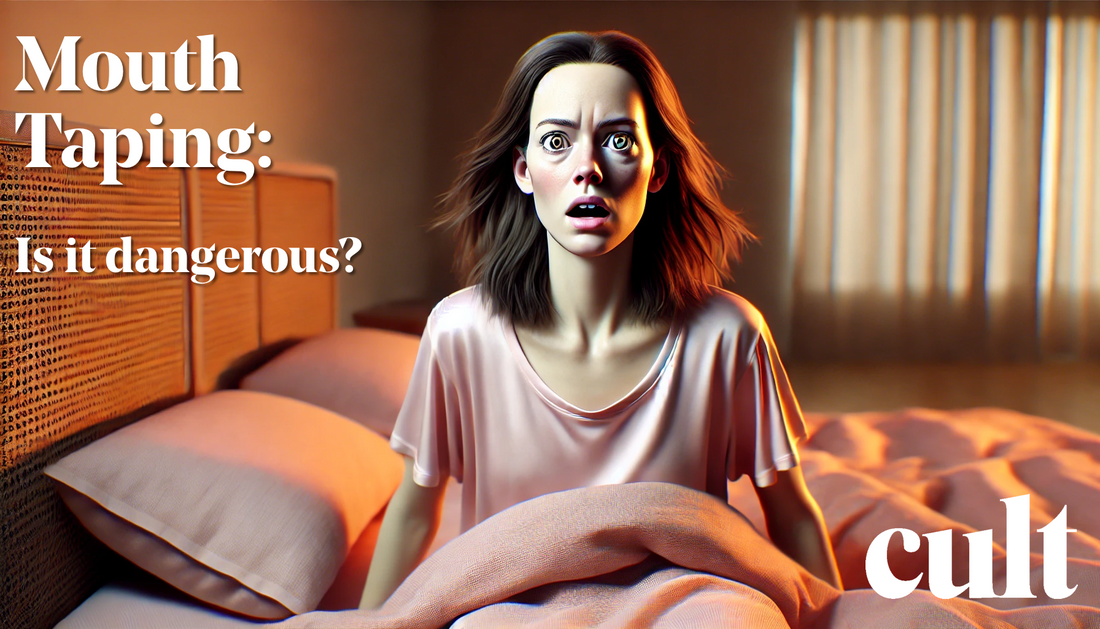
Mouth Taping: Is It Dangerous?
Share
Mouth taping. It sounds intimidating, maybe even extreme, right? But for those who practice it, the benefits are undeniable. Videos about mouth taping are circulating everywhere—from social media to health forums—sparking debate about its safety. Is taping your mouth shut really the key to better sleep, or just another passing trend with unnecessary risks?
Let’s be clear: for the majority of people, mouth taping is safe. In fact, when done correctly, it’s a simple, non-invasive way to promote nose breathing, which has numerous benefits for your health. But like any health practice, there’s a right way to do it—and that's what we’re going to explore.
Why People Are Turning to Mouth Taping
The concept behind mouth taping is straightforward: it encourages nasal breathing during sleep. And there’s strong evidence that nasal breathing, as opposed to mouth breathing, can lead to:
- Better sleep quality
- Less snoring
- Improved oxygen intake
- Reduced dry mouth and throat
- Decreased likelihood of waking up tired or groggy
Nose breathing helps filter and humidify the air, protects your respiratory system, and even helps regulate blood pressure. So, why are so many people skeptical of mouth taping? Mostly, it’s fear of the unknown. But like any health trend, mouth taping comes with precautions to keep in mind, especially if you have pre-existing conditions like sleep apnea or nasal congestion. Let’s look at the facts.
Addressing the Concerns: Why Mouth Taping Isn’t Dangerous for Most People
-
Obstructive Sleep Apnea (OSA) Concerns
Yes, if you have severe sleep apnea, taping your mouth could exacerbate the problem. However, for individuals without diagnosed sleep apnea, mouth taping does not create breathing issues. The key is to ensure that you can comfortably breathe through your nose before trying mouth taping. If nasal congestion is a frequent issue, that’s where the solution needs to start—not with avoiding mouth taping. -
Nasal Congestion and Breathing Issues
Worried about blocked nasal passages? Don’t be. Mouth taping isn’t about forcing your body to do something unnatural; it’s about encouraging your body to rely on its natural breathing mechanism—your nose. If you have nasal congestion from allergies or a cold, treating that first is wise. But once your nasal passages are clear, mouth taping is a perfectly safe technique. -
Skin Irritation
Some people have expressed concern over potential skin irritation. But the solution here is simple: use the right tape. Medical-grade paper tape, designed for sensitive skin, is a great choice and easily found in most drugstores. It’s gentle on the skin and removes without leaving irritation behind. -
Anxiety or Panic Concerns
Feeling nervous about taping your mouth? That’s completely natural. It’s a new sensation, but for most people, it’s one they get used to quickly. Start small: try taping your mouth while awake for short periods of time, and gradually build up to wearing it while you sleep. Mindfulness techniques and relaxation exercises before bed can also help reduce anxiety.Follow Us on TikTok
@jointhecultco Mouth taping carries risk. Heres whay you need to know The tape i use is @BreatheBetter CULT #mouthtapingforsleep #mouthtaping ♬ original sound - Breathe Better CULT
The Science Backs Nasal Breathing
Even if mouth taping sounds unconventional, the benefits of nasal breathing are well-established. Studies show that breathing through your nose boosts oxygen intake, reduces snoring, and helps stabilize your heart rate during sleep. The science behind this is straightforward: when you breathe through your nose, you engage your diaphragm more efficiently, ensuring better oxygenation and a deeper, more restorative sleep.
For those without major underlying sleep disorders, mouth taping is simply a way to encourage this natural process.
Who Should Approach Mouth Taping with Caution?
While mouth taping is safe for most, certain individuals should consult with a healthcare provider before trying it. This includes:
- People with moderate to severe sleep apnea who rely on mouth breathing as a safety mechanism during sleep
- Individuals with serious nasal blockages due to sinus issues or chronic allergies
- Anyone with severe anxiety or panic disorders, though for many, these reactions fade with time and gradual practice
How to Mouth Tape Safely
Ready to try it? Here’s how to get started safely:
-
Choose the Right Tape
Opt for medical-grade paper tape. It’s designed for sensitive skin and is easy to remove in the morning. Some even recommend a specialized mouth tape like Somnifix, designed specifically for this purpose. -
Start Gradually
If the idea of sleeping with your mouth taped feels overwhelming, start by practicing it while awake. Wear the tape for 10-20 minutes at a time during the day to get used to the sensation. -
Clear Your Nasal Passages
If you have nasal congestion, use a saline spray or nasal decongestant before taping your mouth to ensure your nose is clear and ready for breathing. -
Focus on Sleep Hygiene
Mouth taping works best when combined with other sleep hygiene practices. Ensure you’re going to bed at the same time each night, your room is dark and cool, and you’re avoiding caffeine and screen time before bed.
The Verdict: Is Mouth Taping Dangerous?
The short answer is no. For most people, mouth taping is safe, effective, and easy to integrate into your nightly routine. It’s a practice rooted in the science of nasal breathing and offers a simple way to improve sleep quality, reduce snoring, and wake up feeling more refreshed.
While there are some exceptions to be cautious about, the vast majority of people can try mouth taping with minimal risk. If you’ve ever felt like mouth breathing was interfering with your sleep, this could be the natural solution you’ve been searching for. Consult with a healthcare provider if you have concerns, and start small to see if mouth taping could make a big difference in your sleep quality.
Sleep well—naturally!

